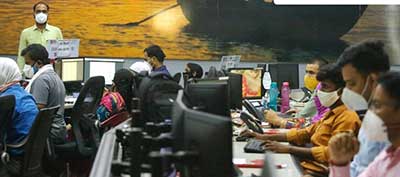Relevance: GS-2: Issues Relating to Development and Management of Social Sector/Services relating to Health, Education, Human Resources;
Relevance: GS-3: Infrastructure
Key Phrases: self-sustainable urban settlements; area based developments; linkage of ICCC and CCTNS; nerve centre for Operation Management;
Context
- Recently a 2-day Smart Cities Conference was held in Surat on April 18
and 19, Union Housing and Urban Affairs Minister announced that
- 80 Integrated Command and Control Centres (ICCCs), an integral component of the Smart Cities Mission, have already been set up.
- While the remaining 20 would be completed by August 15 this year.
Key highlights
- ICCCs are spread across various states that have been developing Smart Cities, with states such as Tamil Nadu, Uttar Pradesh, Madhya Pradesh and Gujarat leading in terms of the total number of ICCCs set up.
What is the Smart Cities Mission and what makes a city ‘smart?’
- The Smart Cities Mission (SCM) aims at developing 100 cities, which were shortlisted, into self-sustainable urban settlements.
- The mission was launched on June 25, 2015 and was projected as one aimed at transforming the process of urban development in the country.
- Among its strategic components are
- ‘Area-based development’, which includes.
- City improvement (retrofitting),
- City renewal (redevelopment) and
- City extension (greenfield development), plus
- A pan-city initiative in which ‘smart solutions’ are applied covering larger parts of the city.
- ‘Area-based development’, which includes.
- Key focus areas of the scheme include construction of
- Walkways, pedestrian crossings, cycling tracks.
- Efficient waste-management systems.
- Integrated traffic management and assessment.
- The scheme also assesses various indices to track urban development such as the Ease of Living Index, Municipal Performance Index, City GDP framework, Climate Smart Cities assessment framework, etc.
What is an Integrated Command and Control Centre?
- ICCCs are designed to enable authorities to monitor the status of various amenities in real time.
- These were aimed at controlling and monitoring
- Water and power supply,
- Sanitation,
- Traffic movement,
- Integrated building management,
- City connectivity and
- Internet infrastructure
- The ICCCs are now also linked to the CCTNS (Crime and Criminal Tracking Networks and Systems) network under the Ministry of Home Affairs.
- The ICCC of a smart city acts as a “nerve centre” for operations management.
- It processes a complex and large pool of data sets at an aggregated
level.
- Eg - it is now the go-to source for integrated traffic management monitoring.
- The ICCC is the nodal point of availability of all online data and information relating to smart services included in a smart city, such as like LED street lighting, CCTV surveillance cameras.
Case Study: Role of ICCC during COVID-19 Pandemic
- They served as war-rooms for Covid-19 management.
- They were used for managing the outbreak, with real-time surveillance and monitoring of districts across the country that were affected by the coronavirus disease - in Bhopal.
- The Central Data Dashboard was effectively used by the officials for managing status of Covid-positive cases in various administrative zones.
- These war-rooms were also used for tracking people under quarantine and suspected Covid-19 cases.
What is the current status of the Smarts Cities Mission?
- The ambitious project was announced in 2015 with an initial deadline of 2021 for the first lot of 20 smart cities out of the 100 selected.
- But, the cities were selected over a period of two years between 2016 and 2018, each with a deadline of completion within 5 years from the time of their selection.
- NITI Aayog recommended the extension of timeline until 2023 due to delays caused by the pandemic.
- Last year, MoHUA announced extension to June 2023.
- The SCM has so far covered overed
- 140 public-private partnerships,
- 340 'smart roads',
- 78 'vibrant public places',
- 118 'smart water' projects and
- Over 63 solar projects.
How much has been spent?
- Out of the total outlay of Rs 2,05,018 crore, projects worth Rs 93,552 crore were proposed to be developed by the Centre and state funds.
- In a statement on Wednesday, the Ministry noted that as on date, almost 100% of these projects — projects worth Rs 92,300 crore — have been work-ordered.
- Financial progress has accelerated: from 2018 when the total expenditure was Rs1,000 crore, it has now increased to Rs 45,000 crore.
- According to its proposed investments in the Mission, the Ministry plans
to spend
- Rs 43,040 crore on mobility,
- Rs 25,435 crore on energy and environment,
- Rs 43,441 on social economic development,
- Rs 41,481 crore on area development, and
- Rs 29, 465 crore on water and water management
What next?
- Centre prepared 60-point action plan.
- MoHUA has begun work to finalise its recommendation for providing ICCCs as a service to states and smaller cities.
- The Ministry aims to finalise an ICCC model and implement a pilot project across six major states — Uttar Pradesh, Maharashtra, Karnataka, Madhya Pradesh, Rajasthan and Tamil Nadu.
Source: Indian Express
Mains Question
Q. Mention the importance of Integrated Command Control Centres in smart city mission (SCM). Also mention the status of projects of SCM.








